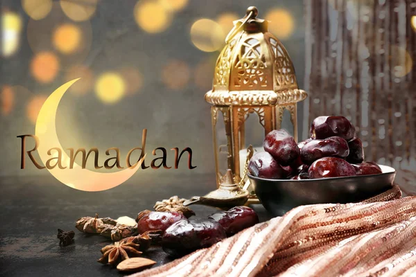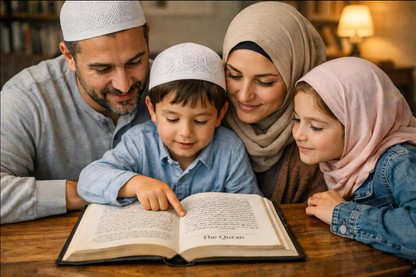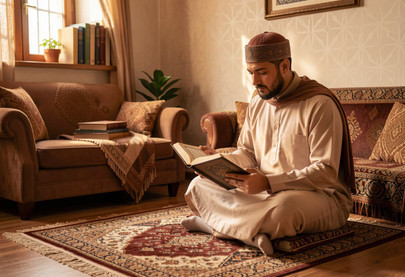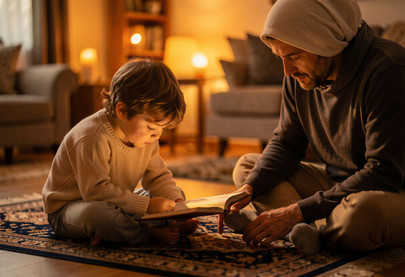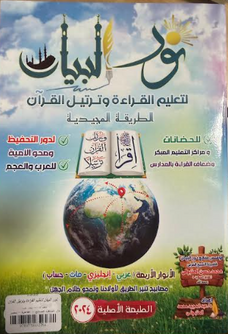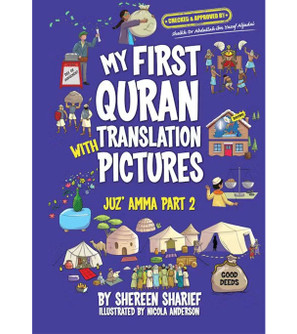A Guide to Ramadan 2025 for Modern Muslims
Ramadan is the ninth month of the Islamic calendar and is a special time for fasting, praying, and reflecting. It marks the month when the Quran was revealed to the Prophet Muhammad (ﷺ). As Ramadan 2025 approaches, Muslims may find it challenging to balance their spiritual duties with modern life. Many use digital tools to help them study the Quran and manage their time during fasting.
This guide will explain the spiritual meaning of Ramadan, offer tips for fasting, and suggest ways to stay connected with your community. It will help make Ramadan a meaningful and transformative experience.
The Spiritual Significance of Ramadan
Ramadan is a very important month in Islam because it’s when the Quran was revealed to the Prophet Muhammad (ﷺ). Allah says in the Quran:
"The month of Ramadan [is that] in which was revealed the Quran, a guidance for the people and clear proofs of guidance and criterion." (Surah Al-Baqarah 2:185)
Fasting during Ramadan is one of the five pillars of Islam. It’s an act of worship and devotion to Allah. This month is a time for self-reflection, discipline, and building a stronger connection with the Quran. It’s a special time that links the Quran’s revelation with the Muslim community.
Preparing for Ramadan 2025
Getting ready for Ramadan 2025 requires preparation in three main ways: spiritually, practically, and educationally. These steps will help make your Ramadan experience fulfilling and meaningful.
Spiritual Preparation
It’s important to set personal goals for growth and reflection during Ramadan. This month is a time to renew your faith, get closer to Allah, and understand the Quran better. The Prophet Muhammad (ﷺ) said:
"Whoever fasts in Ramadan with faith and hoping for a reward from Allah will have his past sins forgiven." (Sahih al-Bukhari)
Doing charity and helping others is also encouraged during Ramadan. This not only fulfills your religious duty but also helps you feel connected to others. It’s also a good idea to focus on gratitude and spiritual growth to set a positive tone for the month.
Practical Preparation
Planning your meals for Suhoor (pre-dawn meal) and Iftar (meal at sunset) will help you keep your energy up. Choose healthy, hydrating foods to support your fast. Organizing your work, school, and social activities ahead of time will also help you focus on prayers and reading the Quran. Setting up a prayer space at home and gathering the supplies you need will help create a peaceful environment for worship.
Educational Preparation
Learning more about Ramadan and its meaning can help you understand this special time better. The Prophet Muhammad (ﷺ) advised:
“Take advantage of five before five: your youth before your old age, your health before your illness, your wealth before your poverty, your free time before your busy time, and your life before your death.” (Narrated by Ibn Abbas)
Attending workshops or lectures about Islam and Ramadan can also be helpful. These steps will help you prepare spiritually and practically for Ramadan 2025.
Observing Fasting: Guidelines and Considerations
Fasting during Ramadan is one of the five important acts of Islam. It’s a time to grow spiritually and reflect. Fasting means not eating or drinking from dawn (Fajr) until sunset (Maghrib). Allah says in the Quran:
“Eat and drink until the white thread of dawn is clear to you from the black thread of night. Then complete the fast until night.” (Surah Al-Baqarah 2:187)
The Basics of Fasting
During Ramadan, Muslims fast by not eating or drinking anything, including water, from dawn until sunset. The pre-dawn meal, Suhoor, and the meal at sunset, Iftar, are important for keeping up energy throughout the day. Some people, like the sick, children, travelers, and the elderly, don’t have to fast. They can either make up the fast later or give charity instead.
Healthy Eating During Ramadan
Eating the right food is important to stay energized. For Suhoor, choose foods like oats or whole grains, which release energy slowly throughout the day. Iftar meals should include lean proteins, fruits, vegetables, and plenty of water to stay hydrated. Drinking enough water between Iftar and Suhoor helps avoid tiredness.
Managing Daily Life
During Ramadan, you might need to change your daily routine. Make time for work, school, and prayers. Try to stay calm and manage stress to avoid feeling exhausted. Balance your daily tasks with your spiritual practices so that Ramadan can be a time of growth, devotion, and productivity.
Deepening Spiritual Growth in a Digital Age
Technology can help you grow spiritually during Ramadan. It offers easy ways to learn and connect with Islamic teachings.
Using Technology for Quran Study
Apps, podcasts, and online classes make studying the Quran easier than before. You can listen to lectures, learn from scholars, and hear Quran recitations at any time. This makes learning more flexible and convenient.
Connecting with the Community
Online platforms allow Muslims to connect with others. You can share experiences, join discussions, and feel more connected during Ramadan. This is especially helpful for those who can't attend in-person events or feel isolated.
Minimizing Distractions
Technology is helpful, but it's important to avoid distractions like social media. Focus on your worship and spiritual practices. This helps you keep Ramadan a time for personal growth and reflection.
Engaging with the Community During Ramadan
Importance of Community
Ramadan is a time to come closer to family and friends. It helps build unity within the Muslim community. Mosques and community centers become more important during this month. These places give space for prayer, reflection, and community activities.
Praying together and sharing Iftar meals create a sense of belonging. These moments bring people together and help build respect and support in the community.
Volunteer Opportunities Social Media and Technology Use
Volunteering is a great way to give back during Ramadan. Supporting local charities and food banks helps those who are less fortunate. This way, everyone can feel the blessings of the month.
Organizing community Iftar events brings people together. This is especially important in places where many people are fasting alone. Reaching out to non-Muslims also helps spread understanding and shows the kindness of Ramadan.
Social Media and Technology Use Support from Non-Muslims
Social media and technology can help you connect with a larger community during Ramadan. You can find online resources, like lectures and articles, to learn and engage with others.
Sharing your experiences on Instagram or Facebook can inspire others to reflect on the spiritual side of the month. You can also stay connected with family and friends through video calls or group chats, keeping the community spirit alive even from a distance.
Allies and Inclusion
Support from Non-Muslims
Non-Muslims can support Muslims during Ramadan by learning about its importance, respecting fasting, and encouraging their Muslim friends and coworkers. Simple actions, like being mindful of meal times or taking part in charity events, can help create a sense of inclusion.
Workplace and Community Awareness
It’s important to raise awareness of Ramadan in workplaces and communities. Employers can help by adjusting break times for prayers or offering a quiet space for reflection. Creating awareness helps make an environment where Muslims can practice their faith without any obstacles.
Celebrating Eid al-Fitr: The Conclusion of Ramadan
The Significance of Eid al-Fitr
Eid al-Fitr marks the happy end of Ramadan, a time to celebrate finishing the fast and worship. It is a day to be thankful and happy, remembering the patience, strength, and devotion shown during the month. As Allah says in the Quran:
"And [for] you to complete the period and to glorify Allah for that [to] which He has guided you, and perhaps you will be grateful." (Surah Al-Baqarah 2:185).
Traditions like wearing new clothes, praying together, and giving gifts show the spirit of unity and gratitude. Zakat (charity) is an important part of Eid, making sure that those in need can also enjoy the celebrations.
The Prophet Muhammad ﷺ says regarding the dearness of fasting to Allah: “Allah said: ‘Every deed of the son of Adam is for him except fasting; it is for me and I shall reward for it…’” (Bukhari & Muslim)
Preparing for the Festivities
Eid celebrations start by organizing meals, buying gifts, and gathering with family and friends. Planning special meals and picking out clothes for loved ones is important, just like preparing for the community prayers that show unity and brotherhood.
Continuing Ramadan Values Post-Eid
After Eid, it’s important to keep the spiritual growth you achieved during Ramadan. Continuing to help the community, setting new personal goals, and staying compassionate helps you carry the values of Ramadan into your everyday life.
This guide has looked at the spiritual importance of Ramadan, the need for preparation, and how to balance modern life with faith during this holy month. From fasting rules and spiritual growth to community involvement and celebrating Eid, Ramadan is a time to reconnect with Allah and fellow believers.
Keep the essence of Ramadan by growing your faith, supporting your community, and making lasting changes that reflect the month’s teachings. May Ramadan 2025 bring growth, reflection, and unity, bringing peace and blessings to both your personal and community life.

